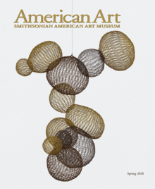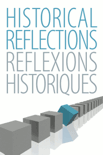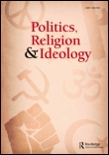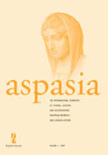
Fascism
Scope & Guideline
Fostering scholarly insights into the nature of fascism.
Introduction
Aims and Scopes
- Transnational Fascism Studies:
The journal emphasizes the study of fascism across national borders, examining how fascist movements interacted and influenced each other globally, particularly during the interwar period. - Cultural and Performative Aspects:
A significant focus is placed on the cultural manifestations of fascism, including architecture, art, and propaganda, highlighting how these elements contributed to the identity and ideology of fascist regimes. - Intellectual and Ideological Frameworks:
The journal investigates the ideological underpinnings of fascism, exploring the intellectual contributions that shaped fascist thought and its relationship with other political movements. - Gender and Fascism:
Research on the roles of gender within fascist movements is a core area, analyzing how fascist ideologies constructed notions of masculinity and femininity and their impact on societal structures. - Comparative Fascist Studies:
The journal encourages comparative analyses of fascist regimes, facilitating discussions on similarities and differences across various national contexts.
Trending and Emerging
- Fascism and Global Networks:
A growing interest in the transnational dimensions of fascism is evident, with research focusing on the networks and interactions between fascist organizations across different countries during the early 20th century. - Performative Practices of Fascism:
There is an increasing emphasis on the performative aspects of fascism, exploring how rituals, architecture, and public spectacles were used to construct and reinforce fascist identities. - Fascism and Gender Studies:
Research exploring the intersection of fascism with gender studies is on the rise, reflecting a broader trend of analyzing how fascist ideologies shaped and were shaped by gender roles and identities. - Contemporary Fascism and Right-Wing Extremism:
The journal is increasingly addressing contemporary manifestations of fascism, including the rise of right-wing extremism and populism, indicating a relevance of fascist studies to current political climates. - Critical Re-evaluations of Historical Figures:
There is a trend towards re-assessing the roles of lesser-known figures within fascist movements, moving beyond traditional narratives to include diverse perspectives and contributions.
Declining or Waning
- Localized Fascist Movements:
There has been a noticeable decline in studies focusing solely on localized or national fascist movements without broader transnational connections, as the journal increasingly emphasizes global interactions. - Traditional Historical Narratives:
Research grounded in traditional historiography of fascism, which often focuses on well-documented events and figures, appears to be waning in favor of innovative and interdisciplinary approaches. - Nostalgia and Popular Culture:
Themes that explore nostalgia for fascist regimes in popular culture have become less frequent, suggesting a shift towards critical analyses rather than celebratory or romanticized portrayals. - Fascism and Economic Policies:
Discussions specifically centered on the economic policies of fascist regimes are less prevalent, with more emphasis now placed on cultural and ideological dimensions.
Similar Journals

Eikon Imago
Bridging Disciplines: Where History Meets Creativity.Eikon Imago is an esteemed academic journal published by Universidad Complutense de Madrid, Facultad de Geografía e Historia, focusing on a diverse range of subjects within the Arts and Humanities. With an ISSN of 2254-8718 and an e-ISSN matching its print counterpart, the journal embraces an Open Access model since 2012, ensuring that its rich content remains freely accessible to researchers, professionals, and students around the globe. Lauded for its rigorous contributions to the fields of History, Religious Studies, and Visual Arts and Performing Arts, Eikon Imago has achieved notable rankings, including Q3 in several categories and a commendable position within the Scopus metrics, emphasizing its relevance and impact. With a commitment to interdisciplinary scholarship, the journal provides a valuable platform for innovative research and critical discourse, fostering a deeper understanding of cultural phenomena. As it converges through the years from 2019 to 2024, Eikon Imago continues to play a pivotal role in shaping the academic landscape of the humanities.

ArtCultura-Revista de Historia Cultura e Arte
Exploring the Intersections of Art and Culture.ArtCultura-Revista de História Cultura e Arte, published by Universidade Federal de Uberlândia, is a leading peer-reviewed journal in the fields of cultural, historical, and artistic studies. With its commitment to Open Access publishing since 2007, the journal provides an invaluable platform for researchers, professionals, and students to disseminate and access high-quality research without financial barriers. The journal's dedication to scholarly excellence is reflected in its robust editorial process and diverse range of articles that delve into the intricate connections between art and culture, promoting interdisciplinary dialogue and global perspectives. Situated in Brazil, ArtCultura plays a pivotal role in enhancing the visibility of Latin American contributions to these vital fields, thereby fostering academic collaboration and cultural understanding. We invite you to explore the rich tapestry of ideas and insights published in our journal, located at AV PARA, 1720 CAMPUS UMUARAMA, UBERLANDIA 38400-902, BRAZIL.

Anacronismo e Irrupcion
Unlocking New Perspectives on Anachronic PhenomenaAnacronismo e Irrupcion is a dynamic academic journal published by UNIV BUENOS AIRES, dedicated to the exploration of historical and contemporary narratives within the frameworks of cultural studies and literary theory. Since its inception, this open access journal has been disseminating knowledge freely and fostering interdisciplinary dialogue, making significant contributions to the understanding of anachronic phenomena and their societal implications. As a vital resource for researchers, professionals, and students alike, it serves not only to highlight Argentina's intellectual contributions but also to connect global scholarly perspectives. While the journal continues to develop its impact and visibility, it attracts a diverse readership by inviting innovative research that challenges conventional academic boundaries. With ISSN 2250-4982, the journal's inclusive approach ensures that cutting-edge ideas are accessible to all, reinforcing the importance of inclusive academia in today's research landscape.

HISTORY OF PHOTOGRAPHY
Advancing Knowledge: The Interdisciplinary Study of PhotographyHISTORY OF PHOTOGRAPHY is a prestigious scholarly journal published by Taylor & Francis Ltd, focusing on the rich and evolving narrative of photography as an art form and cultural phenomenon. With an ISSN of 0308-7298 and E-ISSN 2150-7295, this journal has established a significant presence since its inception in 1977, with an anticipated run into 2024. Positioned in the Q4 category of the Visual Arts and Performing Arts field, it ranks within the 51st percentile among its peers, affirming its role in the scholarly discourse of photography. Although not an Open Access journal, it maintains accessibility for academics through institutional subscriptions and various library networks. The journal aims to foster interdisciplinary dialogue, encompassing diverse perspectives on the history, theory, and practice of photography, making it an invaluable resource for researchers, professionals, and students alike who are seeking to deepen their understanding of this dynamic medium.

American Art
Unveiling the Cultural Significance of American ArtAmerican Art, published by University of Chicago Press, is a leading journal in the fields of cultural studies and visual arts, with a notable impact in both academic and professional circles. Since its inception in 1996, the journal has provided a robust platform for scholarly discourse, showcasing a diverse array of research that examines the evolution, context, and significance of American art and its cultural implications. With an impressive Q2 ranking in Visual Arts and Performing Arts and a Q3 ranking in Cultural Studies for 2023, American Art remains a vital resource for researchers, professionals, and students alike, facilitating a deeper understanding of the intricacies within American artistic practices. While currently not offering open access, the journal is accessible through various academic databases, ensuring reach to a wide audience dedicated to the intersection of art and culture. The journal's commitment to innovative scholarship makes it an indispensable resource for anyone seeking to explore the dynamic landscape of American art.

HISTORICAL REFLECTIONS-REFLEXIONS HISTORIQUES
Advancing Historical Inquiry Through Innovative ScholarshipHistorical Reflections / Reflexions Historiques is a pivotal academic journal in the field of history, published by Berghahn Journals. Established to provide a platform for innovative historical scholarship, the journal offers a unique blend of theoretical discussions and empirical studies that critically engage with new interpretations and methodologies. With a robust reputation evidenced by its category ranking in the 2023 Q3 History quartile and a Scopus ranking of #1164 in the Arts and Humanities, Historical Reflections serves as an essential resource for researchers, professionals, and students alike. Although the journal is not available through open access, it contributes significantly to historical discourse through its diverse range of articles, fostering a deeper understanding of past events and their implications for the present and future. As it continues to evolve from its inception in 1977 to the present day, Historical Reflections remains committed to advancing the field through rigorous analysis and scholarly debate.

Politics Religion & Ideology
Charting New Territories in Political and Religious DiscoursePolitics Religion & Ideology, published by Routledge Journals, Taylor & Francis Ltd, is a leading academic journal dedicated to exploring the intricate relationships between politics, religion, and societal ideologies. With an ISSN of 2156-7689 and E-ISSN of 2156-7697, this journal offers a crucial platform for researchers and scholars to disseminate their findings and engage in meaningful dialogue within these fields. Since its inception in 2011 and continuing through 2024, Politics Religion & Ideology has garnered recognition for its significant contribution to the exploration of contemporary issues, currently holding a Q1 rank in Philosophy and Religious Studies, highlighting its importance in these disciplines. Researchers will find the journal's articles insightful and thought-provoking, significantly enhancing their academic endeavors. While it does not offer open access, the journal remains a cherished resource for professionals and students alike, offering vital perspectives and fostering a deeper understanding of the role of religion and ideology in shaping political landscapes.

Aspasia
Bridging gender dynamics with historical insights.Aspasia is a distinguished open-access journal dedicated to the fields of Gender Studies and History, published by BERGHAHN JOURNALS and based in the United Kingdom. Since its inaugural issue in 2011 and achieving open access in 2019, Aspasia has committed to providing a platform that explores diverse scholarly perspectives on women's experiences and gender dynamics within historical contexts. With an impact factor reflective of its rigorous peer-review process, Aspasia has achieved notable rankings, including Q4 in Gender Studies and Q3 in History for 2023, indicating its growing influence within these disciplines. The journal is indexed in prominent databases, showcasing its relevance and contribution to ongoing academic discourse. Researchers, professionals, and students are encouraged to explore its rich content, fostering critical dialogue and advancing knowledge in the understanding of gender and historical narratives.

Revista de Historia das Ideias
Advancing Interdisciplinary Dialogues in HumanitiesRevista de História das Ideias, published by Coimbra University Press, is an esteemed open-access journal that has been instrumental in advancing the study of cultural, historical, and philosophical perspectives since its inception in 2011. With an E-ISSN of 2183-8925 and a commitment to free scholarly dissemination since 2016, this journal aims to provide a vibrant platform for researchers, professionals, and students to explore interdisciplinary dialogues surrounding the evolution of ideas and their implications on society. The journal is categorized in the fourth quartile of cultural studies, history, and philosophy, reflecting its contribution to these fields, as evidenced by its notable rankings in Scopus. With a reach that spans across various domains, Revista de História das Ideias offers invaluable insights into the intellectual currents shaping contemporary thought, making it a crucial resource for anyone engaged in the humanities.

STUDI STORICI
Unraveling Complexities of HistorySTUDI STORICI, published by CAROCCI EDITORE SPA, is a distinguished journal in the field of History, recognized for its contributions to historical scholarship since its inception in 1966. With an ISSN of 0039-3037 and an E-ISSN of 2036-458X, this journal is acclaimed for delving into various historical themes and methodologies, making notable influences in both academic research and public discourse. It holds a commendable Q2 ranking in the 2023 Scopus category for History, placing it in the top tier of historical research journals. The journal’s curated articles span a wide range of historical periods and contexts, providing critical insights and fostering scholarly dialogue among researchers, professionals, and students alike. Despite not being open access, STUDI STORICI remains an essential resource for anyone seeking to engage with the complexities of history and its implications in contemporary society. Based in Rome, Italy, at VIA SARDEGNA 50, 00187, it continues to uphold a rich legacy of excellence instrumental in shaping the field.